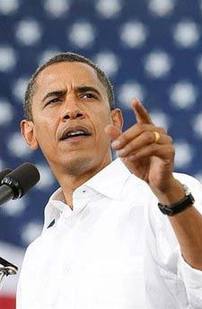随着华尔街金融危机愈演愈烈,美国总统选举的两党对阵形势也在不断变化。据本周四公布的两项权威民调结果显示,共和党带来的“佩琳效应”正在逐渐消退,而在美国两党全国代表大会后陷入苦战的民主党总统候选人奥巴马,经过两个星期逆势奋战后,已再度回到大会前的领先态势,选民认为奥巴马比麦凯恩更有能力解决经济问题。

|

US Democratic presidential nominee Barack Obama speaks during a rally at Cashman Field on September 17, 2008 in Las Vegas. [Agencies]
|
|
|
US Democrat Barack Obama topped two key national polls Thursday which showed the country's financial crisis reverberating through the White House race and "Palin power" fading for the Republican ticket.
The Democratic hopeful, who has been lacerating rival John McCain over his capacity to rescue the US economy, led 49 to 45 percent in a new poll of likely voters nationwide by Quinnipiac University.
In a CBS/New York Times survey, Obama was up by 48 percent to 43 percent, with the race apparently reverting to the narrow Democratic ascendency seen before two presidential nominating conventions.
McCain's selection of Alaska Governor Sarah Palin as his vice presidential running mate had rocked the race and electrified the conservative base, pushing the Republican into the lead in polls and spreading panic among some Democrats.
But recent opinion snapshots polls appear to show Palin's injection of momentum for McCain diminishing.
"Senator Obama is right back where he was before the so-called convention bounces with a four-point lead," said Maurice Carroll, director the Quinnipiac University polling institute.
"The Democraticdiscombobulation after the selection of Governor Palin as GOP running mate seems to be steadying."
The Quinnipiac survey suggested that economic arguments may be swaying support towards Obama.
In the poll, 51 percent said that McCain's proposed tax cut will help the rich while only nine percent say it will aid the middle class.
Thirty-three percent say Obama's tax plans will help the middle class and only nine percent say it will benefit the rich.
The Quinnipiac poll showed that Obama led 54-40 percent among women voters, the key demographic which Palin is targeting for Republicans.
He had a 91 percent lead among African-Americans and was the favorite of young voters and those over 55, while independents were split 46 to 45 percent.
McCain did best among men, 50-43 percent and led 71 percent to 21 percent among white evangelical Christians -- a figure reflecting Palin's impact on core Republican voters.
The survey was conducted between September 11 and Tuesday, so is likely to have been influenced by the latest US financial crisis which erupted at the weekend.
The CBS survey found that independents who favored Obama in late August moved to McCain in days following the Republican convention, then returned to Obama in the last week, the survey showed.
Independents favored Obama over McCain by 46 percent to 41 percent in the survey conducted between September 12 and 16 with a margin of error of three percent.
The CBS poll also showed that despite McCain's attempts to seize the mantle of "change" from Obama, voters were more likely to see the Democratic candidate as an agent of reform -- by 65 to 37 percent.
The poll also found that women have returned to Obama after favoring McCain by five points just two weeks ago. Obama now leads McCain by 54 percent to 38 percent among all women.
Though Obama has the edge on the national stage, another fresh survey by CNN/Time magazine/Opinion Research Corp. had the two candidates virtually tied in five pivotal states: Florida, Indiana, North Carolina, Ohio and Wisconsin.
Obama and McCain were expected to renew their battle over the global credit crisis, after central banks injected more than 300 billion dollars into the markets and pressure mounted on Morgan Stanley and Swiss bank UBS.
Obama was campaigning in the key western battleground of New Mexico, while McCain and Palin were due to stump in midwestern Iowa, which polls show is trending towards the Democrats and battleground Wisconsin.
On Wednesday, the candidates traded stinging blows over the crisis as Obama ridiculed McCain as a lifelong member of the "old boys' network" that the Republican said had driven the US economy into crisis.
McCain vowed to take on Wall Street's "casino culture" after the US government's 85-billion-dollar bailout of giant insurer American International Group, the latest shock of a horrific fortnight for the financial industry.
Both candidates indicated the Federal Reserve's lifeline was regrettable but necessary to prevent AIG's troubles engulfing the wider economy.
Ahead of the November 4 election, Obama is driving home his polling edge on the economy to hammer his Republican adversary as out of touch with voters' anxieties in the face of rising job losses and home seizures.
(Agencies)

Vocabulary:
discombobulation: a feeling of embarrassment that leaves you confused 迷茫,困惑
evangelical Christians: 福音派基督徒
(英语点津 Helen 编辑)